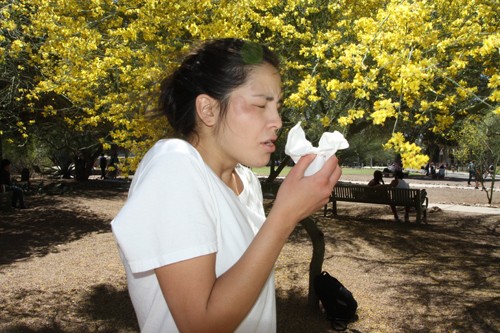While the spring season means more allergy aggravations than usual for the rest of the country, allergies are a year-round problem for Tucsonans.
Spring is a common time for allergies to hit because of the palo verde trees, said Dr. Mark Brown, a UA professor of pediatrics who specializes in pulmonology at University Medical Center.
Genetically, springtime is when plants pollinate, which can be very potent, said Dr. Martin Bartels, an allergist and immunologist at Southern Arizona Allergy Associates. Between 42 and 50 percent of the general population may manifest allergic symptoms to some degree, he said.
“”It’s kind of been my worst year since being here,”” said Nate Kennedy, a systems engineering senior.
Kennedy said he sneezes all the time as it is, but at one point this year he was sick with a fever, runny nose and a lingering cough.
“”I know a lot of my friends are complaining about it right now,”” said Michelle Gibson, a political science senior.
Gibson said she is asthmatic and currently has a sore throat from the pollen. She uses her inhaler for her allergies because she doesn’t like to take medications.
“”Most allergic rhinitis is not life-threatening, so people tolerate it,”” Bartels said. “”But it can be debilitating. It can make you miserable.””
The pollination can cause allergic reactions in people, but allergies are also genetic, Bartels said.
In addition, some residual viruses are from the winter months linger into the spring.
“”The viruses themselves can actually destroy the integrity of the mucus membranes and drive more allergic reactions by making you more sensitive,”” he said.
Hay fever (allergies) have been bad for the past couple of months, said Dr. Randy Horwitz, who specializes in integrative medicine, allergy and immunology at UMC and is the medical director of the Arizona Center for Integrative Medicine.
“”The first recommendation we make sometimes is to shut the windows and use the air conditioning,”” Horwitz said. “”The challenge is (that) it’s so beautiful out people don’t want to do that.””
Brown recommends that people remove plants from their homes to which they know they are allergic.
People can take over-the-counter antihistamine pills and topical nasal sprays as remedies.
Claritin, Allegra, Zyrtec and Benadryl are common options, Horwitz said.
Kennedy said he takes Advil for cold and sinus problems if it is really bad. Otherwise, he just deals with the symptoms on his own.
“”They are very effective, and relatively speaking, very safe,”” Bartels said.
Instead of covering up symptoms with decongestants, nasal sprays and antihistamines, people with moderate allergies can get an allergy shot regimine that takes three to five years to complete, Bartels said.
For patients with moderate allergies, it may be the only way to manage long-term hay fever and get off medications, he said. Allergy shots get down to the root source of the problem because they modify the immunologic process. This way, the immune system can produce healthy, protective antibodies instead of allergic antibodies, Bartels said.
For most people, there are over-the-counter antihistamines that can be taken that provide symptomatic relief, he said.
“”If you’ve got significant hay fever, that’s going to work the best for you in the long run, no questions asked,”” Bartels said.
There are also natural supplements and nasal sprays that people can try if they prefer not to take medications, Horwitz said.








